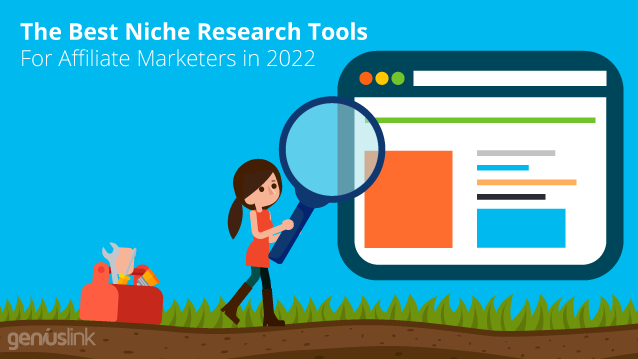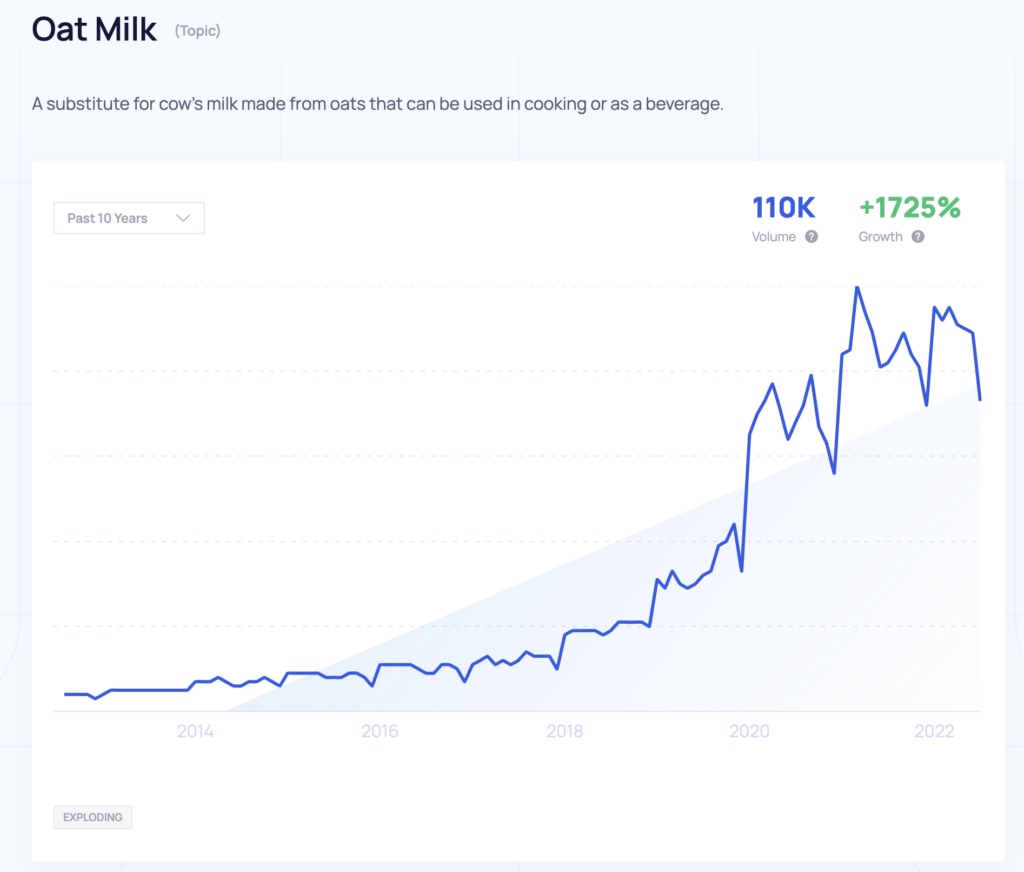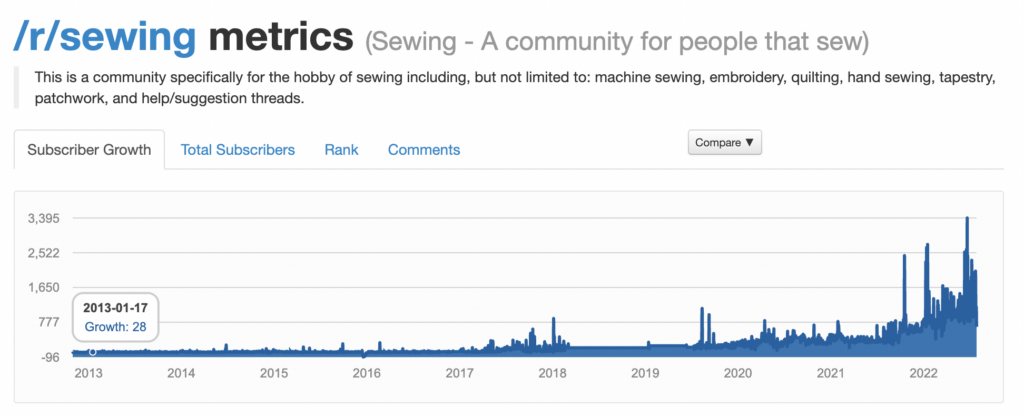7 Best Niche Research Tools for Affiliate Marketers
-
Jesse is a Native Montanan and the co-founder and CEO of Geniuslink - or, as he likes to say, head cheerleader. Before Jesse co-founded Geniuslink, he was a whitewater rafting guide, worked at a sushi restaurant, a skate/snowboard shop, was a professional student, and then became the first Global Manager at Apple for the iTunes Affiliate Program.
- March 19, 2024

Today, let’s talk about some great tools you can use to refine your fit within a particular niche.
For this article, we’re going to assume you’ve already found a niche, that way we can focus the article on improving your ability to market within that niche. We’ve written previously about why and how to find a niche, if you want to start with a primer. Check out our thoughts on niche site ideas, or how to find a niche within the Amazon Affiliates program.
But let’s say you’ve found a perfect niche for your affiliate marketing efforts. You’re passionate about the topic and there’s a well-defined community around it. You’re willing to put in the time to grow your content, and there is a surplus of low-competition keywords you can use. Great!
But just creating content based on what you’re excited about or what you think will be attractive to your audience can only get you so far. That’s why we’ve compiled a list of the seven most valuable niche research tools.
After all, “the riches are in the niches”, as the saying goes. Which is cutesy, sure, but also accurate as heck.
So what is a niche research tool?
In a nutshell, a niche research tool is any tool that helps you better understand your niche. This could be gaining more insight into your customers, such as what keywords they’re searching for.
There are also tools to improve your SEO. These can help you brainstorm ideas for content, find backlink opportunities, and monitor traffic.
Some of these SEO tools can even help you understand your main competitors’ efforts better, like their SEO performance, what keywords they’re investing in, or their performance in paid and organic search.
An important bit to note is that this space can feel crowded and confusing. There are dozens of niche research tools, often overlapping each other quite a bit. My advice is that the “best” tool for you is the one that accomplishes your goals within budget.
Rather than spending a bunch of time on an exhaustive search of all competitor research tools, for instance, lean more towards finding a tool that meets your needs. Give it a trial run (they almost all have trial periods), and if it’s helpful and doesn’t break the bank, great!
Trying to parse out the thousands of differences among all these tools is time you could better spend improving fit in your niche.
Ahrefs
Ah, Ahrefs.
It’s like x-ray goggles for the internet.
Ahrefs does a lot of everything SEO — broadly, it helps you understand competitors, keywords, and content.
Within those big categories it has a bunch of specific reports and tools, from keyword search traffic to analyzing the strength of your or competitors’ sites.
It’s worth noting as well that SEMrush is a close competitor to Ahrefs, with similar features and price points. So while a detailed breakdown of the pros and cons of each tool is beyond the scope of this particular article (and it’s been done well already), keep in mind that the right SEO tool for you just depends on your goals and unique context.
Unfortunately, tools like Ahrefs and SEMrush start around $100 a month, and that’s not always reasonable for every affiliate marketer.
The good news is, there are a few alternatives, which we’ll cover next.
The Google Ecosystem
Google Trends won’t help you with understanding your own SEO or analyzing what your competition is up to, but it can help with understanding keywords and topics within a niche, or even a niche itself.
Google Trends can help you understand differences in searches by region, sub-region, over time, and more. You can see how searches for Taylor Swift compare to Kim Kardashian, where people search for the term “no cap” the most (lots in the South, not so much in the Mountain West!), or how searches for “tiny house ideas” have grown over time.
Sidenote: Exploding Topics is a good alternative to Google Trends that offers curated results, though it restricts the data available in the free version quite a bit.
But it could offer a starting point for interesting topics to explore more in Google Trends or another tool.

Google Analytics and Google Search Console both have free offerings and can help you understand your content performance and suggest ways to improve your SEO.
Answer the Public
If you’re looking for a great free market research and content idea generator, look no further. Input a keyword of your choice and Answer the Public displays actual search terms people use that include that keyword.

For instance, “chocolate”. The tool displays searches related to the keyword in the form of questions (e.g. “are chocolate m&m halal?”), prepositions (“chocolate for diabetics”), and comparisons (“chocolate and banana cake”). All three examples could be great starting points for content that speaks to the kinds of things your customers care about or have questions around.
This kind of search data can really help you zero in on a specific audience or nuance that you didn’t think to create content around before. You can imagine a nutrition-focused affiliate marketer using this data to make specific content around chocolate, whether it’s focused on aligning with religious beliefs, health questions, or recipe ideas.
Questions sites / forums
Sites like Reddit, Quora, Buzzfeed, and Yahoo Answers can be great places to find specific questions, problems, or topics across different niches.
They can be ridiculously valuable for understanding your audience. What features or services do they prioritize? What’s seen as just table stakes? What words do they tend to use (or don’t use)? How do they view advertising in this niche?
Reddit has a particularly strong community ethos for filtering out the spam and trolling that inhabits much of the internet. Comments with high upvote to downvote ratios and comments that have been “gilded” (the poster has been gifted reddit “gold”, i.e. a free reddit premium subscription) can be especially good signals for what your audience finds valuable.
You could also check out resources for understanding broader trends, like Reddit Trending (same with Google Trends). A lot of the highlighted trends will be broader than your specific niche, so it might take some manual sorting to sort the useful from the junk.
But maybe you’ll find value in connecting your niche to a trending topic you might not have thought of otherwise. For instance, we highlighted sewing and embroidery as a niche topic in a previous article of affiliate niche ideas.
Our hypothetical affiliate creator hero looks on Reddit Trending and sees that r/sewing is a trending subreddit “specifically for the hobby of sewing including, but not limited to: machine sewing, embroidery, quilting, hand sewing, tapestry, patchwork, and help/suggestion threads.” The subreddit is growing like gangbusters, especially this year, and could help spur some great new ideas.
The top-rated thread for this past week is “First time sewing: making the dresses from Season 2 of Bridgerton!” — maybe our hero could be interested in creating content that appeals to Bridgerton fans?

Similarweb
We use Similarweb here at Geniuslink, and we like it so much because it’s like an easy-to-use version of Google Analytics and can get you started with some high-level metrics for your (or any other) site.
Plus, you can use it alongside Ahrefs to understand the strength of potential affiliate partners at the level of specific domains.
Open data
Sometimes what you really need is some hard data on your niche. This can definitely be easier said than done, though, and expect that the more granular you want to get, the more likely that you’ll have to pay for access to relevant data.
For instance, U.S. regional population numbers are freely available via the U.S. Bureau of Economic Analysis and can even be automatically visualized with the free Google Public Data Explorer tool.
But if you need a breakdown of 18-24-year-old males who live in California and purchased a mountain bike in the past year, then you’ll have to find an analysis vendor that caters to that market.
But that’s not to say publicly-available data is not valuable. Far from it! And the best part is, you don’t have to be a programmer to access it.
Some Google searching and perusing open data — freely available without restrictions from copyright, patents or other mechanisms of control — can be a solid start for getting a better idea of relevant details to your niche.
The Google Public Data Explorer tool mentioned earlier takes several different open datasets and makes them available via a built-in visualization tool that anyone can use.
My advice is to start with a general Google search of the kind of data you’re interested in. Start general, and work towards more specific searches if the results are there. Find one or two sources that may be promising.
Then, check the Google Public Data Explorer and this list of open datasets to see if any open datasets look like they might hold the data you’re interested in. Then, if you can, dive into a specific open database!
One last note — use caution with statistics aggregators like Statista. They don’t always name their sources (so you have no way of checking the accuracy of the data), update their numbers regularly, and in my experience, are often unreliable.
Finding good data to support your affiliate marketing can feel like finding a needle in a haystack. But with a little legwork and some strategic searching, you can often get a rough idea of the statistics or trends you’re interested in — or at the very least, understand the investment you’re looking at to purchase the data you need.
How Geniuslink Can Help With Niche Research
Last but certainly not least, we’d be remiss to not plug our own services a bit.
With Geniuslink, we don’t help with niche research so much as provide all the tools to ensure you are earning every possible from your efforts, no matter what your niche is or where your audience is coming from.
In short, we’re a link translation and management service that gives you a single, unbreakable link that will direct to the local storefront no matter where a shopper is clicking from. This means an impeccable user experience for your global shoppers, whether they’re coming from the United States, United Kingdom, or the United Arab Emirates, and no matter if you’re selling via YouTube or a blog.
It also means more cash in your pocket, because shoppers can actually complete transactions.
Some Geniuslink clients have reported a 200% increase in affiliate commissions after signing up!
We can also automatically check your link health to make sure the products you are suggesting are still in stock. Finally, when you are ready to start earning commissions from other affiliate programs, we have a helpful tool called Choice Pages.
Choice Pages give your reader a — you guessed it — choice of retailers to purchase from; a simple yet effective tactic we’ve seen boost affiliate revenue in several different contexts.
If you have any questions about how to do niche research as part of your affiliate marketing strategy, we’d love to help.
Or at the least, we can connect you with folks who can help.
Good luck with researching your niche and let us know how we can help in the comments below!
Author
-
Jesse is a Native Montanan and the co-founder and CEO of Geniuslink - or, as he likes to say, head cheerleader. Before Jesse co-founded Geniuslink, he was a whitewater rafting guide, worked at a sushi restaurant, a skate/snowboard shop, was a professional student, and then became the first Global Manager at Apple for the iTunes Affiliate Program.
Author
-
Jesse is a Native Montanan and the co-founder and CEO of Geniuslink - or, as he likes to say, head cheerleader. Before Jesse co-founded Geniuslink, he was a whitewater rafting guide, worked at a sushi restaurant, a skate/snowboard shop, was a professional student, and then became the first Global Manager at Apple for the iTunes Affiliate Program.
More revenue from every link you share
Geniuslink makes localizing, tracking, and managing smart links dead simple, so you can earn more without added work.
